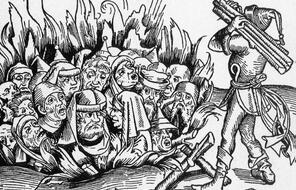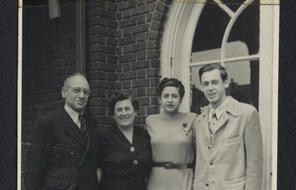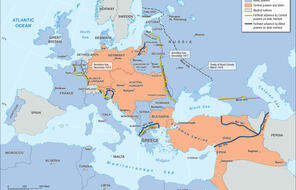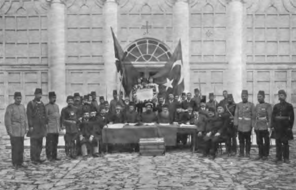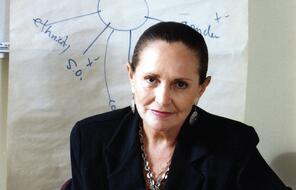Not Just Awareness, But Action
At a Glance
Language
English — USSubject
- Civics & Citizenship
- Social Studies
- Human & Civil Rights
- The Holocaust
In 2016, at a time when many people in the United States were protesting police brutality and racism in America’s justice system, President Barack Obama gave a commencement address at Howard University in Washington, DC. In the speech, he talked about the concerns of many in the audience and about his vision of civic participation and the duties of citizenship:
. . . You have to go through life with more than just passion for change; you need a strategy. I'll repeat that. I want you to have passion, but you have to have a strategy. Not just awareness, but action. Not just hashtags, but votes. . . .
[T]o bring about structural change, lasting change, awareness is not enough. It requires changes in law, changes in custom. If you care about mass incarceration, let me ask you: How are you pressuring members of Congress to pass the criminal justice reform bill now pending before them? If you care about better policing, do you know who your district attorney is? Do you know who your state’s attorney general is? Do you know the difference? Do you know who appoints the police chief and who writes the police training manual? Find out who they are, what their responsibilities are. Mobilize the community, present them with a plan, work with them to bring about change, hold them accountable if they do not deliver. Passion is vital, but you've got to have a strategy.
And your plan better include voting—not just some of the time, but all the time . . . not just when it’s cool, not just when it's time to elect a President, not just when you’re inspired. It's your duty. When it’s time to elect a member of Congress or a city councilman, or a school board member, or a sheriff. That’s how we change our politics—by electing people at every level who are representative of and accountable to us. It is not that complicated. Don’t make it complicated.
And finally, change requires more than just speaking out—it requires listening, as well. In particular, it requires listening to those with whom you disagree, and being prepared to compromise. When I was a state senator, I helped pass Illinois’s first racial profiling law, and one of the first laws in the nation requiring the videotaping of confessions in capital cases. And we were successful because, early on, I engaged law enforcement. I didn’t say to them, oh, you guys are so racist, you need to do something. I understood, as many of you do, that the overwhelming majority of police officers are good, and honest, and courageous, and fair, and love the communities they serve.
And we knew there were some bad apples, and that even the good cops with the best of intentions—including, by the way, African American police officers—might have unconscious biases, as we all do. So we engaged and we listened, and we kept working until we built consensus. And because we took the time to listen, we crafted legislation that was good for the police—because it improved the trust and cooperation of the community—and it was good for the communities, who were less likely to be treated unfairly. And I can say this unequivocally: Without at least the acceptance of the police organizations in Illinois, I could never have gotten those bills passed. Very simple. They would have blocked them.
The point is, you need allies in a democracy. That's just the way it is. It can be frustrating and it can be slow. But history teaches us that the alternative to democracy is always worse. That's not just true in this country. It’s not a black or white thing. Go to any country where the give and take of democracy has been repealed by one-party rule, and I will show you a country that does not work.
And democracy requires compromise, even when you are 100 percent right. This is hard to explain sometimes. You can be completely right, and you still are going to have to engage folks who disagree with you. If you think that the only way forward is to be as uncompromising as possible, you will feel good about yourself, you will enjoy a certain moral purity, but you’re not going to get what you want. And if you don’t get what you want long enough, you will eventually think the whole system is rigged. And that will lead to more cynicism, and less participation, and a downward spiral of more injustice and more anger and more despair. And that's never been the source of our progress. That's how we cheat ourselves of progress.
We remember Dr. [Martin Luther] King’s soaring oratory, the power of his letter from a Birmingham jail, the marches he led. But he also sat down with President [Lyndon] Johnson in the Oval Office to try and get a Civil Rights Act and a Voting Rights Act passed. And those two seminal bills were not perfect—just like the Emancipation Proclamation [issued by Abraham Lincoln, freeing slaves in the Confederacy during the American Civil War] was a war document as much as it was some clarion call for freedom. Those mileposts of our progress were not perfect. They did not make up for centuries of slavery or Jim Crow or eliminate racism or provide for 40 acres and a mule. But they made things better. And you know what, I will take better every time. I always tell my staff—better is good, because you consolidate your gains and then you move on to the next fight from a stronger position.
. . . Change isn’t something that happens every four years or eight years; change is not placing your faith in any particular politician and then just putting your feet up and saying, okay, go. Change is the effort of committed citizens who hitch their wagons to something bigger than themselves and fight for it every single day. . . . 1
Connection Questions
- How might President Obama sum up the duties of citizens? What stands out to you in his vision of what it takes to bring about social and political change?
- Obama argues that we “cheat ourselves of progress” by refusing to compromise. What does he mean? How should citizens figure out when they can compromise to make progress? Are there any ideals or beliefs that should never be compromised?
- Other readings in this chapter explore the role of social media in civic participation. What does Obama’s speech add to your thinking about the power and limitations of social media to bring about change?
- William Henry Hastie, the first African American to serve as a federal judge, said: “Democracy is a process, not a static condition. It is becoming rather than being. It can easily be lost, but never is fully won. Its essence is eternal struggle.” What do you think Hastie meant? Do you think President Obama would agree? What else do you think is part of the “essence” of democracy?
- What might it look like to apply some of Obama’s ideas about making change to an issue that you care about?
- Author James Baldwin said, “Not everything that is faced can be changed, but nothing can be changed until it is faced.” What do you think he meant by this? How does this idea connect to Obama’s ideas about change, as articulated in his speech?
- 1White House Office of the Press Secretary, “Remarks by the President at Howard University Commencement Ceremony,” speech delivered by Barack Obama at Howard University, Washington, DC, May 7, 2016.
How to Cite This Reading
Facing History & Ourselves, "Not Just Awareness, But Action," last updated August 2, 2016.

